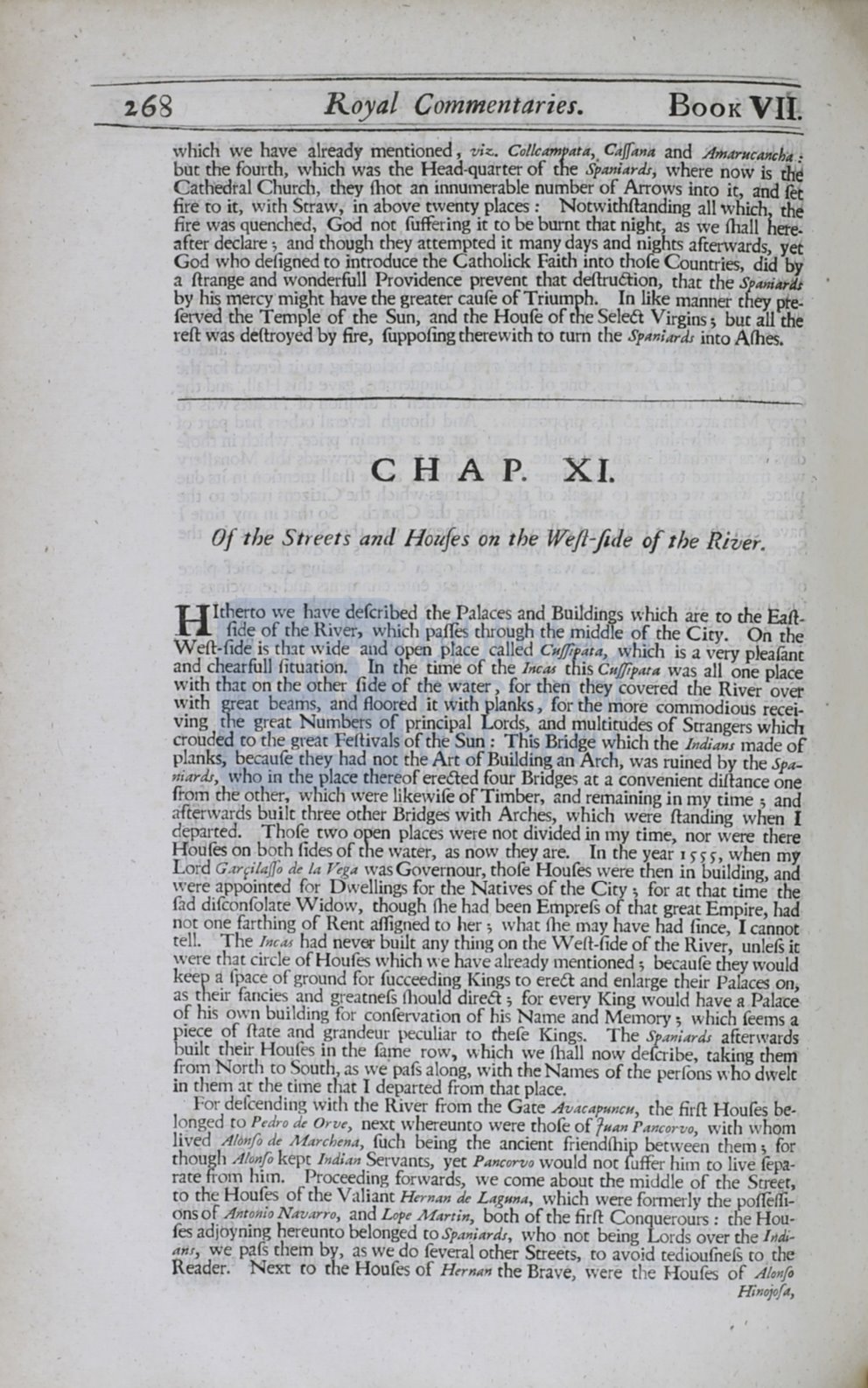

~68
•.
BooK
VII.
which we have already mentioned
1
viz..
Collcampata,. Caffana
and
Amaruc-.anch":
but
the
fourth, which was the Head-quarter of the
Spamards,
where now is
the
Cathedral Church, they {bot an innumerable number o.f
Arro~s
into
it,
and fet
fire to
it
with Straw,
in
above twenty places: Notw1chfianding all which the
fire was quenched, God not
f
uffering
it
to be burnt that night, as we !hall
hete–
after declare ; and though they attempted it many days and nights afterwards,
yet
God who defigned to introduce the Catholick Faith
into
thofe
Countries~
did
by
a firange and wonderfull Providence prevent
t~at
defuuetio.n, that the
SJaniardt
by
his
mercy·might have the greater caufe of Triumph.
In like manner
chey pte–
ferved the Temple of the Sun, and the Houfe of che Selett Virgins ;
bur
all the
refi
was
defuoyed by
fire,
fuppofing therewith to
cum
the
Sp11niards
into
Allies.
CH AP.
XI.
Of
the
Streets and Houfes on the
Weft-fide of the River.
:·
H
ltherto we have defcribed the Palaces and Buildings which are to the
Eaft–
fide of the River, which pajfes through the middle of the
Cicy.
On the
Weft-fide is that wide and open place called
Cu!fipata,
which
is
a very pleafanc
and chearfull fituation.
In
die time
of the
JncM
this
Cuffipata
was all one place
with that on the other fide of the water, for then they covered the River
over
with great beams, and floored
it
with planks, for the more commodious recei-
·
ving the great Numbers of principal Lords, and multitudes of Srrangers
which
crouded to the great Fe!Hvals of the Sun : This Bridge which the
lndian1
made of
planks, becaufe they had not the
Art
of Building an Arch, was ruined by the
Spa–
niards,
who
iR
the place thereof ereCl:ed four Brioges at a convenient dill:ance one
from the other, which were likewife ofTimber, and remaining in my time; and
afterwards built three other Bridges with Arches, which were fianding when I
departed. Thofe two open places were not divided in
my
time, nor were there
Houfes on bqth fides of the water, as now they are.
In
the year
1
5'
>
5,
when
my
Lord
Garrilaj[o
de
la
Vega
was Governour, thofe Houfes were then in building, and
' ·ere appointed for Dwellings for the Natives of the
Ciry ;
for at that time the
fad difconfolare Widow, though fhe had been EmpreCs of that great Empire, had
not one farthing of Rent affigned
to
her; what ilie may have had ftnce, I cannot
tell. The
IncM
had never built any thing on the W efi:-fide of the River, unlefs
it
were that circle ofHoufes which we have already mentioned; becau(e they would
keep a
f
pace of ground for fucceeding Kings to erelt and enlarge their Palaces on;
as their fancies and greatnefs fhould direct ; for every
King
would have a Palace
of his
own building for
confervation of his Name and Memory ; which feems a
piece of fiate and grandeur peculiar to thefe Kings. The
Spaniards
afterwards
built their Houfes in the fame row, which we iliall now defcribe, taking them
from North
to
ouch, as we pa£ along, with the Names of the perfons who dwelt
in them at the time mat I departed from that place.
· or defcending with the River from the Gate
Avacapuncu,
the
fir.fl:Houfes be–
longed
to
Pedro
de
Orve,
next whereunto were chofe of
{uan Panco
rvo,with whom
lived
Alonfo de
Marchena,
fuch
being
the ancient friendfhip between them ;
for
though
A!onfo
kepr
Indian
Servants, yet
Pancorvo
would not fuffer him to live fepa–
rare ftom him. Proceeding forwards, we come about the middle of the Street,
to the Houfes of the Valiant
Hernan
de
Laguna,
which were formerly the poffeffi–
ons of
Alttonio Navarro,
and
Lope
Martin,
both of the firll: Conquerours : the Hou–
f
es adjoyning hereunto belonged to
Spaf!iard1,
who not being Lords over the
lndi–
an1,
we pafs them by, as we do feveral other Streecs, to avoid tedioufueiS ro the
Reader. Next co the Houfes of
Hernan
the Brave, were the Houfes of
Alonfa
Hinojofa,














